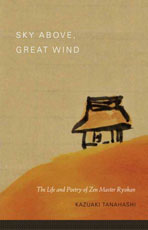The Zen monk Ryokan (1758 -1831) was a pilgrim, a hermit, and a beggar. After completing ten years of training at a monastery, he left behind religious institutions and lived in solitude at the top of a mountain. Ryokan wrote poems to acknowledge the beauty of nature and the transitory nature of life. He played with the children in the village where he would go to beg for food, and he savored his reclusive life. At the same time this Zen monk had compassion for others. His yearning was explicit in these words: "Oh, that my monk's robes were wide enough to embrace the whole world."
Kazuaki Tanahashi is a Zen teacher, a translator, and a renowned calligrapher. He has great respect for this extraordinary poet whose writings reflect his deep humanity, wit, playfulness, humility, and tenderness towards youngsters and the natural world. Ryokan fashions astonishing haikus out of his experiences such as sleeping on a grass pillow, telling a winter storm not to blow so hard, pondering the cold as being harsh on his skin, getting lost while watching the moon, and counting fleas at daybreak. Near the end of his wandering Ryokan wrote:
"What legacy shall I
leave behind?
Flowers in spring
Cuckoos in summer
Maple leaves in autumn."
